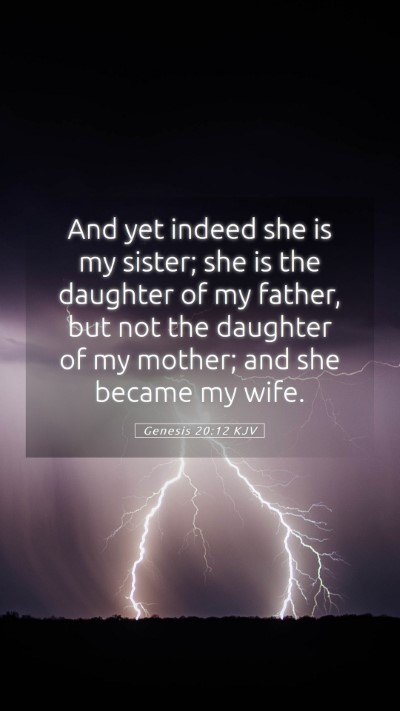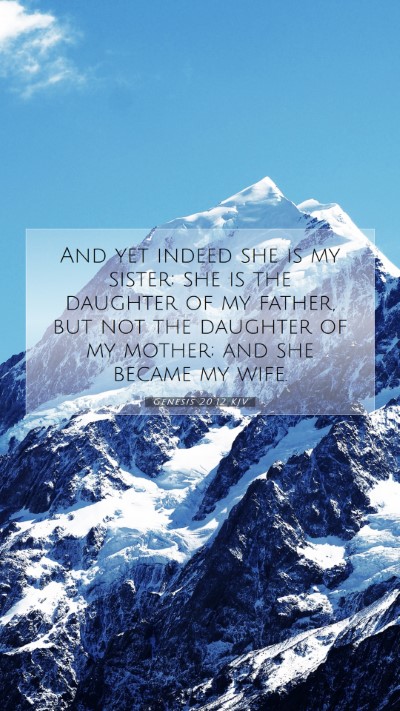Understanding Genesis 20:12 - A Comprehensive Bible Verse Commentary
Genesis 20:12 states, "And yet indeed she is my sister; she is the daughter of my father, but not the daughter of my mother; and she became my wife." This verse involves complex family relationships and the dynamics of truth in the context of human interactions. Below, we explore interpretations and insights derived from public domain commentaries, providing a thorough understanding of this scripture.
Contextual Background
In the narrative of Genesis, Abraham's journey through different lands often leads him to find himself in perilous situations concerning his wife, Sarah. This specific verse highlights a pivotal moment where Abraham, claiming Sarah as his sister, navigates a moral and ethical dilemma.
Familial Relationships
According to Matthew Henry, the term 'sister' in this verse incorporates a broader familial context. Sarah was indeed Abraham's half-sister, sharing the same father, which Abraham employs to mitigate dangers from local rulers who might covet her beauty. This response reflects a strategic understanding of family ties amidst potential threats.
Moral Implications
Albert Barnes adds that Abraham's statement—while technically accurate—is a reflection of his fear. During their travels, Abraham's deception concerning the identity of Sarah illustrates the complex interplay of truth and safety in dire circumstances. It prompts readers to consider the morality of Abraham's choice in light of his desire to protect himself and his wife.
Faith and Fear
Adam Clarke's commentary highlights Abraham's moment of weakness—a lack of faith in God's protection. Instead of trusting in divine providence, Abraham resorts to deception, illuminating a significant theme in scripture: even the faithful can falter in moments of fear. This underscores a broader spiritual lesson on reliance on faith during trials.
Key Themes in Genesis 20:12
- Truth vs. Deception: The struggle between presenting reality and safeguarding oneself.
- Family Dynamics: Understanding relationships as integral to identity and social interactions.
- Human Vulnerability: The acknowledgment that even revered figures have moments of doubt.
- Divine Providence: Recognizing the importance of faith in the face of adversity.
Cross References
This verse connects with several other scripture passages that enrich its understanding:
- Genesis 12:13: Earlier instance of Abraham's similar response in Egypt.
- Genesis 26:7: Isaac also claims Rebekah is his sister, illustrating generational patterns.
- Matthew 10:16: Jesus advises his followers to be as wise as serpents, highlighting the notion of prudence in dangerous situations.
Application in Bible Study
This scripture serves as an excellent topic for Bible study groups, as it encourages discussions on ethics, relationships, and reliance on God. The insights from various commentaries offer deep Bible study lessons for anyone keen on exploring the meaning of Bible verses.
Discussion Questions
- What does this verse teach us about the nature of truth?
- How can we apply the lessons from Abraham's experience in our lives today?
- In what ways does fear influence our decision-making?
Conclusion
Genesis 20:12 reveals the complexity inherent in human relationships and interactions. Through the lens of biblical exegesis and commentary, this verse challenges believers to reflect on truthfulness, the nature of familial bonds, and the importance of faith. Engaging with such scriptures enhances our Bible verse interpretations and fosters a deeper Bible study understanding.


